How to have a healthy ego

This is the second part of a series of essays. To see the first one, click here . This is not the end of a conversation, but the beginning of one. When I praise the ego, I am not at all saying that the ego should never be questioned, or challenged. All I'm saying is, instead trying to eradicate the ego, let's use this questioning and challenging to work toward a stronger, healthier ego - which implies, to some degree and in some aspects , a more realistic ego, a more accurate self-concept, a more truthful and precise image, an image with a greater degree of resolution , which, rather than drifting away into vague abstraction, more closely resembles the reality on the ground, the nuts and bolts of our neurological, biological, embodied, carnal situation. ....But only to a certain degree and in specific aspects. The image will never be entirely one with reality. The map cannot be identical with the territory, and to wish that it were is to wish for the eradication of the eg